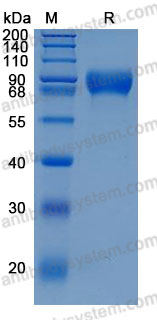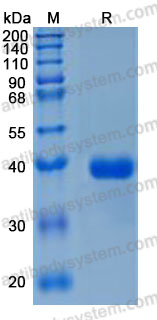Catalog No.
AHN20601
Biological activity
Measured by the ability of the immobilized protein to support the adhesion of mouse neuroblastoma cells (Neuro‑2A). Recombinant human FLRT3 (Cat #: AHN20601) immobilized at 5 μg/mL, 100 μL/well, will mediate >50% Neuro‑2A cell adhesion.
Expression system
Mammalian Cells
Species
Homo sapiens (Human)
Protein length
Lys29-Pro528
Nature
Recombinant
Endotoxin level
<0.1 EU/μg of the protein by the LAL method.
Purity
>90% as determined by SDS-PAGE.
Accession
Q9NZU0
Applications
Bioactivity, ELISA, Immunogen, SDS-PAGE, WB
Form
Lyophilized
Storage buffer
Lyophilized from a solution in PBS pH 7.4, 5% Trehalose, 5% Mannitol.
Reconstitution
Reconstitute in sterile water for a stock solution. A copy of datasheet will be provided with the products, please refer to it for details.
Shipping
In general, proteins are provided as lyophilized powder/frozen liquid. They are shipped out with dry ice/blue ice unless customers require otherwise.
Stability and Storage
Use a manual defrost freezer and avoid repeated freeze thaw cycles. Store at 2 to 8°C for one week. Store at -20 to -80°C for twelve months from the date of receipt.
Alternative Names
Fibronectin-like domain-containing leucine-rich transmembrane protein 3, FLRT3, Leucine-rich repeat transmembrane protein FLRT3, KIAA1469
FLRT3 Overexpression Attenuates Ischemia-Reperfusion Induced Vascular Hyperpermeability and Lung Injury Through RND3., PMID:40047936
Mendelian randomization identifies proteins involved in neurodegenerative diseases., PMID:40037332
Effect of FLRT3 on epithelial-mesenchymal transition in clear cell renal cell carcinoma., PMID:39995192
Fgf17: A regulator of the mid/hind brain boundary in mammals., PMID:39327214
Latrophilin-3 as a downstream effector of the androgen receptor induces bladder cancer progression., PMID:39269616
Identifying novel proteins underlying bipolar disorder via integrating pQTLs of the plasma, CSF, and brain with GWAS summary data., PMID:39191728
Integrating plasma proteomics with genome-wide association data to identify novel drug targets for inflammatory bowel disease., PMID:39009667
Latrophilins as Downstream Effectors of Androgen Receptors including a Splice Variant, AR-V7, Induce Prostate Cancer Progression., PMID:39000396
Latrophilin-3 as a downstream effector of the androgen receptor induces urothelial tumorigenesis., PMID:38925569
Brain exposure to SARS-CoV-2 virions perturbs synaptic homeostasis., PMID:38548923
Diagnostic Value of GDF10 for the Tumorigenesis and Immune Infiltration in Lung Squamous Cell Carcinoma., PMID:38517673
Innovate therapeutic targets for autoimmune diseases: insights from proteome-wide mendelian randomization and Bayesian colocalization., PMID:38515381
FLRT3 and TGF-β/SMAD4 signalling: Impacts on apoptosis, autophagy and ion channels in supraventricular tachycardia., PMID:38509727
The FLRT3-UNC5B checkpoint pathway inhibits T cell-based cancer immunotherapies., PMID:38427724
Comprehensive analysis of m6A modification in lipopolysaccharide-induced acute lung injury in mice., PMID:38254010
A protein-encoding CCDC7 circular RNA inhibits the progression of prostate cancer by up-regulating FLRT3., PMID:38225404
Proteome-wide mendelian randomization study implicates therapeutic targets in common cancers., PMID:37735436
Deciphering the implications of mitophagy-related signatures in clinical outcomes and microenvironment heterogeneity of clear cell renal cell carcinoma., PMID:37689589
Serum exosomal m6A demethylase FTO promotes gefitinib resistance in non-small cell lung cancer by up-regulating FLRT3, PTGIS and SIRPα expression., PMID:37330168
Genetic Analysis of Patients with Congenital Hypogonadotropic Hypogonadism: A Case Series., PMID:37108593
Isoform- and ligand-specific modulation of the adhesion GPCR ADGRL3/Latrophilin3 by a synthetic binder., PMID:36746957
Association between night shift work and methylation of a subset of immune-related genes., PMID:36711387
Clinical Characteristics and Genetic Analyses of Patients with Idiopathic Hypogonadotropic Hypogonadism., PMID:36700485
280 mT static magnetic field promotes the growth of postpartum condylar cartilage., PMID:36469671
TGF-β-Induced FLRT3 Attenuation Is Essential for Cancer-Associated Fibroblast-Mediated Epithelial-Mesenchymal Transition in Colorectal Cancer., PMID:35560224
Sex-specific genetic factors affect the risk of early-onset periodontitis in Europeans., PMID:34409643
FLRT2 and FLRT3 Cooperate in Maintaining the Tangential Migratory Streams of Cortical Interneurons during Development., PMID:34301831
Variants in FLRT3 and SLC35E2B identified using exome sequencing in seven high myopia families from Central Europe., PMID:33711669
Human papillomavirus elevated genetic biomarker signature by statistical algorithm., PMID:32537823
Static magnetic fields accelerate osteogenesis by regulating FLRT/BMP pathway., PMID:32446396
Identification of key genes associated with progression and prognosis for lung squamous cell carcinoma., PMID:32411535
Alternative splicing controls teneurin-latrophilin interaction and synapse specificity by a shape-shifting mechanism., PMID:32358586
The Tim-3-Galectin-9 Pathway and Its Regulatory Mechanisms in Human Breast Cancer., PMID:31354733
Increased Expression of Fibronectin Leucine-Rich Transmembrane Protein 3 in the Dorsal Root Ganglion Induces Neuropathic Pain in Rats., PMID:31346030
New genetic findings in a large cohort of congenital hypogonadotropic hypogonadism., PMID:31200363
Knockout of latrophilin-3 in Sprague-Dawley rats causes hyperactivity, hyper-reactivity, under-response to amphetamine, and disrupted dopamine markers., PMID:31176715
Axon Guidance-Related Factor FLRT3 Regulates VEGF-Signaling and Endothelial Cell Function., PMID:30930791
Latrophilin GPCRs direct synapse specificity by coincident binding of FLRTs and teneurins., PMID:30792275
Type 1 Diabetes Mellitus-Associated Genetic Variants Contribute to Overlapping Immune Regulatory Networks., PMID:30524468
Striatal transcriptome of a mouse model of ADHD reveals a pattern of synaptic remodeling., PMID:30110355
Regulation of Cerebral Cortex Folding by Controlling Neuronal Migration via FLRT Adhesion Molecules., PMID:28475893
Tbx2 regulates anterior neural specification by repressing FGF signaling pathway., PMID:27913219
Adipose Gene Expression Profile Changes With Lung Allograft Reperfusion., PMID:27421969
Latrophilin receptors: novel bronchodilator targets in asthma., PMID:27325752
Regulation of FGF signaling: Recent insights from studying positive and negative modulators., PMID:26903404
Structural and Mechanistic Insights into the Latrophilin3-FLRT3 Complex that Mediates Glutamatergic Synapse Development., PMID:26235031
Structural Basis of Latrophilin-FLRT-UNC5 Interaction in Cell Adhesion., PMID:26235030
The miR-124-prolyl hydroxylase P4HA1-MMP1 axis plays a critical role in prostate cancer progression., PMID:25115393
LPHN3, a presynaptic adhesion-GPCR implicated in ADHD, regulates the strength of neocortical layer 2/3 synaptic input to layer 5., PMID:24739570



